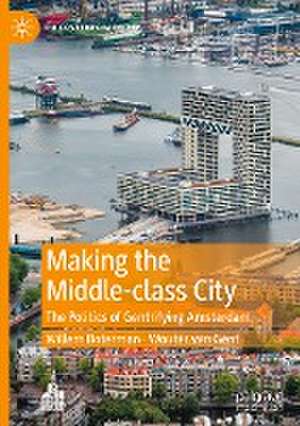Making the Middle-class City: The Politics of Gentrifying Amsterdam: The Contemporary City
Autor Willem Boterman, Wouter van Genten Limba Engleză Hardback – 25 noi 2022
This book seeks to understand the urban transformation of Amsterdam over a 40-year period. In addition to charting social and economic changes associated with gentrification, it analyses the electoral dynamics and middle-class politics that have underpinned Amsterdam’s change to a middle-class city.
Preț: 782.87 lei
Preț vechi: 954.72 lei
-18% Nou
Puncte Express: 1174
Preț estimativ în valută:
149.82€ • 155.84$ • 123.69£
149.82€ • 155.84$ • 123.69£
Carte tipărită la comandă
Livrare economică 14-28 aprilie
Preluare comenzi: 021 569.72.76
Specificații
ISBN-13: 9781137574947
ISBN-10: 1137574941
Pagini: 266
Ilustrații: XVII, 246 p.
Dimensiuni: 148 x 210 x 19 mm
Greutate: 0.47 kg
Ediția:1st ed. 2023
Editura: Palgrave Macmillan US
Colecția Palgrave Macmillan
Seria The Contemporary City
Locul publicării:New York, United States
ISBN-10: 1137574941
Pagini: 266
Ilustrații: XVII, 246 p.
Dimensiuni: 148 x 210 x 19 mm
Greutate: 0.47 kg
Ediția:1st ed. 2023
Editura: Palgrave Macmillan US
Colecția Palgrave Macmillan
Seria The Contemporary City
Locul publicării:New York, United States
Cuprins
1. Introduction.- 2. Class, State and Urban Space.- 3. Social and Spatial Transformations.- 4. The Electoral Geography Of Amsterdam.- 5. Political and Institutional Transformations.- 6. Symbolic Politics within the Local State.- 7. Conclusion.
Notă biografică
Willem Boterman & Wouter van Gent are Urban and Political Geographers at the department of Geography, Planning, and International Development Studies at the University of Amsterdam, The Netherlands.
Textul de pe ultima copertă
This book seeks to understand the urban transformation of Amsterdam over a 40-year period. In addition to charting social and economic changes associated with gentrification, it analyses the electoral dynamics and middle-class politics that have underpinned Amsterdam’s change to a middle-class city.
Willem Boterman & Wouter van Gent are Urban and Political Geographers at the department of Geography, Planning, and International Development Studies at the University of Amsterdam, The Netherlands.
‘How can we explain urban transformations of the past decades? Boterman and Van Gent take on the challenge to explain how and why Social-democratic Amsterdam became a middle-class city. They conceptualize the socio-political cycle of urban transformation to meticulously analyse the growth and growing domination of middle classes that has transformed politics, the local state and urban policies, and has undermined Amsterdam’s quintessential social-redistributive characteristics. The book presents a terrific case study to bring to light the key processes that are reconfigurating European cities...and beyond.’
-Professor Patrick le Gales (SciencePo, Paris)
‘Making the Middle-Class City is the result of a ten-year long ambitious project linking social-economic restructuring, electoral and political shifts to housing, neighbourhood and city-wide transformations. The key innovation of the book is that Boterman and Van Gent demonstrate how the different changes add up to nothing less than the gentrification of not only the city but also of City Hall. They dissect how policy makers and bureaucrats embody middle-class interests and act upon those interests. The paradoxical result is a city that is increasingly unaffordable to both working- and middle-class households. This book speaks to current tensions in many cities: between different class interests, between tourism-led growth and housing affordability, and ultimately between social justice and neoliberalism. It will be required reading for anyone who wants to understand how we got there.’
-Professor Manuel Aalbers (University of Leuven)
‘A superb book that tells us what is distinctive about processes of gentrification in Amsterdam. Outs the peddling of ‘soft gentrification’ by a left-liberal Dutch state and evidences the hard edged impacts of this. The striking correlations between social and electoral change point to the possible futures of gentrifying and diversifying cities elsewhere in the world, beyond Amsterdam. An excellent addition to the gentrification studies literature.’
- Professor Loretta Lees (Director of the Initiative on Cities, Boston University, USA)
-Professor Patrick le Gales (SciencePo, Paris)
‘Making the Middle-Class City is the result of a ten-year long ambitious project linking social-economic restructuring, electoral and political shifts to housing, neighbourhood and city-wide transformations. The key innovation of the book is that Boterman and Van Gent demonstrate how the different changes add up to nothing less than the gentrification of not only the city but also of City Hall. They dissect how policy makers and bureaucrats embody middle-class interests and act upon those interests. The paradoxical result is a city that is increasingly unaffordable to both working- and middle-class households. This book speaks to current tensions in many cities: between different class interests, between tourism-led growth and housing affordability, and ultimately between social justice and neoliberalism. It will be required reading for anyone who wants to understand how we got there.’
-Professor Manuel Aalbers (University of Leuven)
‘A superb book that tells us what is distinctive about processes of gentrification in Amsterdam. Outs the peddling of ‘soft gentrification’ by a left-liberal Dutch state and evidences the hard edged impacts of this. The striking correlations between social and electoral change point to the possible futures of gentrifying and diversifying cities elsewhere in the world, beyond Amsterdam. An excellent addition to the gentrification studies literature.’
- Professor Loretta Lees (Director of the Initiative on Cities, Boston University, USA)
Caracteristici
Provides a new vision for urbanism Uses Amsterdam as case study Recontextualizes class politics within urban space










